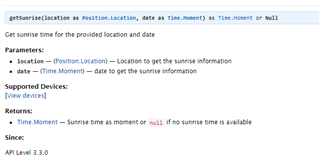the getSunset() function is part of the Weather library.
As we know, it is trivial to calculate sunrise and sunset from just GPS coordinates and time. Since Garmin decided to bundle this function in Weather, does that mean we can only count on getSunset() to return a non-null value if you have your smartphone paired with your device AND have Garmin Connect running? That would be unfortunate.
Also, it is curious that this function requires a time moment. You can always pass it Time.now(). So at 9am this tells me that Sunset is at 19:34:06. So then I enter THAT time and run it again. Then it returns 19:34:22. LOL. If I really care about it down to the second. If I wanted millisecond precision, I'd have to run it maybe 6 or 7 times to zero in. Silly, but fun to think about.


